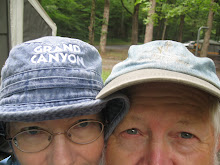I hesitated about writing my Oct. 12, 2011, post Annette Carpenter Decides and putting it up on this blog. Somehow, I felt like decisions that may mean life or death are too personal, too intimate to put out into cyberspace for anyone to read.
The question I grappled with was “Does posting about such profound facets of my mother’s life and the impact on my life and the lives of her loved ones trivialize all that we hold most sacred and dear?
Three experiences have led me to answer “No, posting doesn’t trivialize what is important and cherished.”
First of all have been the posts of bloggers who are on difficult journeys of loss, pain and healing. Some have encountered loss so searing that I cannot fathom how they survived. The experiences they have shared and the discussions they sparked among their readers have often brought light, renewed determination and helpful survival and healing strategies into my own journey.
The second experience was reading comments that visitors have left on my earlier posts. Kind and encouraging comments have led me to a firm conviction that I can trust readers with my truth. They have evidenced respect, even when their own beliefs may be different from mine. And there are blogger friends who have joined the friends, relatives and kind strangers who have sent up prayers and positive thoughts that continue to make a difference for me and my family.
Finally, I chewed on the fact that when I began blogging my purpose was self-centered. I did not want to forget details of this stage of my life, my own retirement daze. Neither journaling via pen and paper nor computer had held my commitment. I have, however, persevered with blogging even though at times sporadic. And my original purpose still applies, but in the past few days, as I pondered what to post and what not to post, I realized Retirement Daze had evolved.
In a continuous state of thinking about the what the next blog post would be, I had fallen into the habit of examining all my experiences from the perspective of what I want to remember. As I continued to post while I was and am coming through some hard things, I began to realize that sifting all experiences through a filter of “What I don’t want to forget” has had an unexpected side effect. It turns out that what I want most to remember are the good things, be they little or big, serious or ridiculous.
That isn’t the unexpected side effect. The unexpected side effect is that there have been so many good things, even in the difficult experiences. That doesn’t mean that I want to erase the difficult or unpleasant.
Perhaps it takes the difficult experiences to strengthen my recognition of the good things, the blessings. And good things shine even brighter for me against the background of the hard things. I wouldn’t choose the hard times, but they are part of the blessings. Now I am ever more conscious of the blessings that are generously and continuously pouring into my life.
I don’t want to forget those blessings. I especially want to remember the blessings of comfort, hope and joy that were part of the challenging times. I want to remember the people and circumstances involved in the delivery of those blessings. It is disturbingly easy for me to forget. Posting helps me remember. And remembering helps me be thankful. And being thankful helps me trust in God’s care of my loved ones and me. And trusting helps me to hope and to heal.
Annette Carpenter Update
Yesterday was my mother’s fourth day since she decided to discontinue dialysis. During that time she has relished being snug in her own studio apartment without the prospect of facing a dialysis treatment.
Lila, a dear sister-in-law, ferried me to Hattiesburg Thursday. We were on hand for the afternoon visit of the hospice admissions nurse. By mid-afternoon my mother, my brother and I were already recipients of the kind of reassurances and comfort that these organizations offer. And by the time Lila delivered me home, the admissions nurse had ordered a wheelchair and it had been delivered, allowing Mother to conserve her diminishing stores of energy.
My mother in her apartment with four great-grands Charlie, left, Luke, Nate and Stella, front.
Her Saturday was filled with visitors, including four of her six great-grandchildren. Sunday husband Walter and I visited. She still wants to “do” for me and help with my stroke recovery. She expended precious energy, sitting on the edge of her bed beside me, directing me in clearing out a corner by her chest of drawers where she had stashed books and magazines.
That mother-daughter effort was a gift to me, one little thing I could physically do for her. Since my stroke it has mostly been prayer and phone calls to her and phone calls to doctors’ offices. I am thankful that there is no distance in prayer. It is always right where it is needed.
Every time Walter and I head to the interstate for the 15- to 20-minute drive to visit his mother or the longer drive to visit my mother, we pass a church’s reader board. I have loved the message the reader board has displayed for several days now: “Prayer is the best wireless connection.” Yes!
















